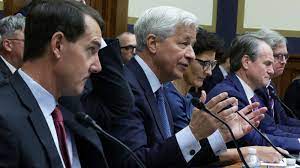The heads of the largest Wall Street banks used their appearance on Capitol Hill on Wednesday to implore senators to halt the Biden administration’s proposed changes to bank regulations. They cautioned that the new proposals could have a detrimental effect on the economy during a period of inflation and geopolitical unrest.
The most influential bankers on Wall Street have frequently testified before Congress since the 2008 financial crisis. Jane Fraser of Citigroup, David Solomon of Goldman Sachs, Jamie Dimon of JPMorgan, and Brian Moynihan of Bank of America were among the witnesses who spoke before the Senate Banking Committee.
This year, the bank CEOs cautioned against the possible risks of overregulating the business, in contrast to prior years when they used the hearing to showcase the industry’s positive aspects.
The Federal Reserve’s planned requirements, which would force large banks to carry more capital on their balance sheets, are among the many measures that the banks are vehemently opposed to since they could negatively impact their profitability. The industry claims that the Basel Endgame restrictions would weaken bank balance sheets and restrict lending at a time when the sector needs greater flexibility.
The Consumer Financial Protection Bureau has also put out suggestions to limit overdraft fees, which have long been a source of income for consumer banks.
“I’ve spent a lot of time doing this. I was a member of the New York Federal Reserve board of directors. In answer to an inquiry, James Gorman, CEO of Morgan Stanley, stated, “I’ve seen a lot of rules, and this proposal just doesn’t make sense.”
The responses from the other seven CEOs to the senators’ queries and their prepared remarks were all the same.
Dimon stated, “(The regulations) should be relooked at because they were not thoughtfully done.”
Senators mentioned the industry’s objections at the session, which have been widely reported in the Washington media landscape in recent weeks.
The chairman of the committee, Sen. Sherrod Brown of Ohio, stated, “You should stop pouring money into lobbying against efforts to protect the taxpayers who subsidize your entire industry.”
Brown, a seasoned opponent of large banks, is not likely to be convinced by the CEOs’ remarks. Rather, the CEOs sought to connect with the committee’s more centrist Democratic members. The majority of Republicans did seem to be against the new laws, but just a small number of Democrats addressed questions in favor of them.
Not even Democratic senator Elizabeth Warren of Massachusetts, who is usually one of the most antagonistic towards Dimon and the other CEOs during these sessions, brought up the subject. Warren requested the CEOs’ backing for her anti-money laundering law on cryptocurrencies. The CEOs, who have long been opponents of cryptocurrency, were more than delighted to openly back her initiative.
Notably, one Republican expressed skepticism over the CEOs’ statements. Using his time, Sen. J.D. Vance of Ohio questioned the CEOs on why their banks back legislation about public policy, such as voter ID laws and gun control, but when it comes to tax breaks and fewer regulations, they prefer to side with the Republicans.
The banking sector has had a difficult year due to the pressure that inflation is putting on consumers’ finances and the high interest rates that have discouraged banks and customers from applying for loans. This year, three major banks failed: First Republic Bank, Silicon Valley Bank, and Signature Bank. The reasons for their failure were concerns over the stability of their balance sheets and a deposit run.
More stringent rules for banks with assets over $100 billion have been recommended by authorities, in part because of this year’s bank runs at Silicon Valley Bank and First Republic.


















